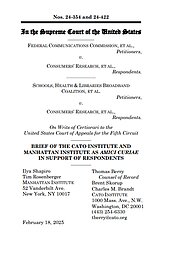Yet, because the FCC outsources revenue collection and disbursement to a nominally private company that the FCC created—the Universal Service Administration Company (USAC)—the government euphemistically designates the tax as a regulatory “fee.” USAC sets the rates paid by carriers, and the government collects around $8 billion of these “fees” annually, which are often buried as a line item in Americans’ monthly wireless and home phone bills. At most, the FCC rubberstamps USAC’s proposed rates, but FCC action is not even a prerequisite for these rates to take effect. That’s because USAC’s proposals are automatically “deemed approved” after 14 days.
A consumer protection nonprofit called Consumers’ Research contested USAC’s imposition of these “fees.” After USAC and the FCC persisted, Consumers’ Research challenged the subsidy program in federal court. On rehearing en banc, the Fifth Circuit Court of Appeals held that these fees are taxes and that this “double-layered delegation” of Congress’s taxing power is unconstitutional. The government appealed to the Supreme Court, which granted review. Now Cato, joined by the Manhattan Institute, has filed an amicus brief supporting Consumers’ Research.
Article I grants the People’s elected representatives in Congress “all legislative Powers,” including the power “to lay and collect taxes.” Our brief explains why the statutory scheme violates this command, focusing on two major points. First, Section 254 of the Telecommunications Act impermissibly transfers Congress’s taxing power to an administrative agency and furnishes no meaningful restrictions on the FCC’s ability to exact revenues from carriers and their customers. The statute thus represents an unlawful delegation of legislative power. While the Act does contain six aspirational “principles of universal service” to guide the FCC’s discretion, they impose no real restraint on universal service “support” because Congress provided no funding cap, and the principles are too broad to limit the FCC’s discretion.
Second, the FCC’s unprecedented subdelegation to USAC, a wholly private and self-perpetuating nonprofit, is unconstitutional on its own. Rather than taxing phone companies directly, the FCC has ceded to USAC the sovereign functions of tax rate setting, tax collection, and subsidy disbursement. USAC’s regular exactions from phone companies are “on autopilot”—indeed, it appears the FCC’s passive approvals of USAC tax rates would continue even if the FCC lacked a quorum to commence normal agency operations. Therefore, this uncapped, unmonitored revenue-generating system violates the “private nondelegation doctrine,” which prohibits the government from using private actors to perform sovereign functions.
Our Founding Fathers knew that “the power to tax involves the power to destroy.” Oppressed by the taxes of a distant and unfamiliar parliament in which they had no voice, they created an elected legislature—and the accompanying accountability—as the remedy. The government now purports to have discovered a novel scheme—available all this time—to raise and spend funds outside the strictures of Article I of the Constitution. But the court below correctly recognized that the Constitution gives taxing power to Congress alone. The Supreme Court should affirm that the circuitous, privately managed universal service subsidy program is unconstitutional.



